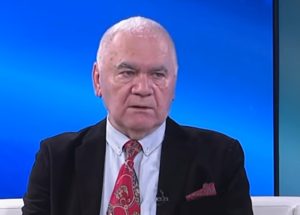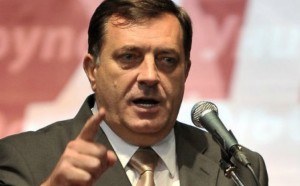The Specter of the Donbass Haunting Bosnia: The Toxic Legacy of Ratko Mladić

13 June, 2021 KRUG 99.
prof. dr. David Pettigrew, Professor of Philosophy, and Holocaust and Genocide Studies, Southern Connecticut State University, Steering Committee Yale University Genocide Studies Program.
In the aftermath of the Appeals Chamber's affirmation of the conviction of Ratko Mladić for genocide and other war crimes, and his life sentence in prison, it is important to confront his toxic legacy in Republika Srpska. The criminal proceedings found that Mladić participated in a Joint Criminal Enterprise involving a common plan to permanently remove Bosnian Muslims and Bosnian Croats from Bosnian Serb claimed territory through documented war crimes. Mladić's war crimes secured the territory of Republika Srpska, which was recognized and legitimized by the Dayton Accords; no less than a reward for a successful genocide. The Appeals Chamber failed to convict Mladić for genocide in the municipalities, which was a betrayal of the victims and of justice. But his toxic legacy endures nonetheless, not only in the banners, murals, and plaques by which he is celebrated, but also in the existence of Republika Srpska itself, which continues to pursue his genocidal war aims to achieve ethnic homogeneity and undermine Bosnia's sovereignty by political means–for the time being–producing political crisis after political crisis.
Theelection of the Biden administration was anticipated in November 2020, as it heralded new hope for Bosnia, including progress in constitutional reform, and movement toward EU and NATO membership. Sergey Lavrov, Foreign Minister of the Russian Federation, chose that moment to visit Bosnia. Lavrov warned against any attempt to change the Dayton Accords, and added that there could be grave consequences. Lavrov's visit began with a symbolic insult to Bosnia's sovereignty, since his arrival took place not in the capital of Sarajevo, but in East Sarajevo, where he met with Milorad Dodik, and Bosnia's national flag was nowhere to be seen. Lavrov's arrival signaled the Russian Federation's support for Republika Srpska's destabilizing threats of secession and opposition to the EU and NATO.
Mr.Dodik also communicated in symbolic terms as he provided Foreign Minister Lavrov with a 300-year old gilded Orthodox Ukrainian icon. The icon was reportedly from the Donbass, which is controlled by Russia-backed separatists. More concerning were the political implications of the gilded Orthodox antique, for the icon connoted ultra-nationalist and destabilizing references. For Mr. Dodik, the controversy surrounding the icon only reaffirmed “brotherly ties between the two Orthodox ‘nations’.”
Mr.Dodik's gift was, no doubt, an expression of appreciation for the Russian Federation's support, including its support when it vetoed the Srebrenica Genocide Resolution in the UN Security Council in 2015, and for its support of Republika Srpska's challenges to the High Representative and to the constitutional court. When the Peace Implementation Council (PIC) has voted to condemn Republika Srpska's provocations, the Russian Federation has abstained. The abstentions of the Russian Federation support Republika Srpska's threats to Bosnia's peace and stability.
Theicon also evoked the “brotherly ties” of Bosnian Serb fighters who have joined Russian-backed fighters in the Donbass war in eastern Ukraine. Hence, a Ukrainian icon gifted to the Russian Foreign Minister, particularly one from the Donbass, suggests that Republika Srpska can be, for the Russian Federation, another front line for its resistance to the EU, NATO, and the West. In other words, the icon suggests that for Russia, Republika Srpska can be for all practical purposes, another Donbass.
Of course, Russian volunteers had already made their way to Bosnia, fighting alongside Bosnian Serb forces in Višegrad in 1992. Recently, Višegrad held a ceremony for Russian volunteers who died participating in atrocities committed by the Army of Republika Srpska. At the ceremony, the President of the Serbian-Russian Association “Zavet” insisted that for the last 200 years, there is no war in which Serbs participated without Russian volunteers. The gilded icon was an invocation of this shared “Zavet”. Bosnian Serbs have, in turn, traveled to the Donbass, resulting in the conveyance of the icon. Such is the meaning of the “brotherly ties,” and the shared “commitment,” or mutual “promise”.
The Russian Federation's interventions extend beyond its “brotherly ties” to Republika Srpska. Its former Ambassador to Bosnia, Pyotr Ivantsov, spoke in support of the HDZparty's goal to reform the election lawin order to gain further political autonomy as a nationalist, mono-ethnic political party, a move that would further entrench ethnic divisions. By supporting nationalists in Bosnia, the Russian Federation advances its thinly disguised revival of Russian imperialism in the region.The Russian Federation even insisted that it would see joining NATO as a hostile act that would require them to react.
Indeed, as part of his confirmation hearings, U.S Secretary of Defense Lloyd J. Austin III, identified Russia as a “malign actor.” But the Russian Federation hardly needs to “react” on its own given the recent non-papers from Europeansources, documents advancing proposals that support its diplomatic objectives. One non-paper, originating in Croatia, supported the goal of Croatian nationalist party HDZ for electoral reform that would allow for monoethnic control of the predominantly Croatian area of the Federation of Bosnia and Herzegovina, control that could lead to a breakaway third entity, or annexation to Croatia.
Another non-paper, allegedly from Slovenia's Prime Minister Janez Janša openly proposes the “peaceful dissolution” of Bosnia as a sovereign state, “by joining a larger part of the Republika Srpska territory with Serbia”…and “joining the predominantly Croatian cantons in Bosnia… with Croatia”. Milorad Dodik, exploited the Slovenian non-paper to renew his calls for secession, calling for “peaceful separation.” The Russian Embassy in Bosnia issued yet another assault on Bosnia's national sovereignty, insisting that according to Dayton, Bosnia should be characterized as consisting of two entities rather than as a single state.
Republika Srpska and the Russian Federation only support the framework of Dayton so as to maintain an uncivil stalemate in Bosnia that prevents constitutional reform that would enable a transition from the ethnic differences of constituent peoples to the shared dignity and rights of all citizens. By supporting Dayton, and its resulting Croat and Serb nationalist parties, thereby maintaining a dysfunctional Bosnia, the Russian Federation has compromised Bosnia's ability to meet its citizens’ needs. It has not only hampered its ability to respond to the current civic crisis, but also to respond to current public health crisis. In this sense, the Russian Federation and its allies have become an existential threat for Bosnia. Such is the toxic legacy of Ratko Mladić.
What then is to be done in the face of the gilded Orthodox icon from Luhansk, an incarnation of Orthodox nationalism, and a manifestation of a sacred political pact to resist NATO, Europe, and the West, whether in the Donbass or in Republika Srpska? Theinternational community must pursue a strategy that would respond to Banja Luka and to Moscow at one and the same time, effectively reining in Mr. Dodik's toxic and destabilizing influence in the region, while neutralizing the malign influence of the Russian Federation.
It is imperative for the High Representative to implement national laws against genocide denial and the glorification of war criminals to restore the rule of law and to counter Mr. Dodik's hate speech. A citizens’ commission should be formed to address the proliferation of genocide denial and the glorification of war criminals in Republika Srpska. The US and EU need to expedite Bosnia's entrance into the EU and Membership in NATO. Given the fact that Bosnia was the victim of international aggression from Croatia and Serbia, and consequently suffered war crimes, including genocide, membership in the EU and in NATO should be viewed as matter of restorative justice.
Such initiatives would muster a response to the destabilizing threat of Republika Srpska and to the toxic legacy of Ratko Mladić. Such initiatives would create a space in which constitutional reform can occur such that a civil society based on citizens with equal rights and dignity would be able to flourish. At this point, we are still waiting for the promise of the Biden administration in this regard.








